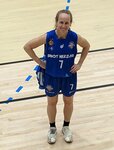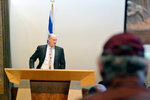 Severna Park
Severna ParkOvercast, 54°
Wind: 9.2 mph, S
 Severna Park
Severna Park




Jonah Helfman walked outside his skate shop in Tel Aviv, Israel, during an October day to find a delivery driver sobbing.
“Her nephew was at the nature party and he went missing, and she went online and saw a video of him being executed, and she recognized the tattoo behind his ear and she just broke down,” Helfman said. “When I understood what was going on, I went into the shop and started crying, and before I had a chance to collect myself, sirens [sounded]. We all ran down in the shelter together.”
This has been the reality since October 7, when Hamas, a militant group that governs the Gaza Strip, infiltrated communities in Israel, massacring 1,400 Israelis and taking more than 200 hostages.
The killings became the latest chapter in a 75-year Israeli-Palestinian conflict.
Hamas military commander Mohammed Deif announced that the assault was in response to Israel's 16-year blockade of Gaza, Israeli raids inside West Bank cities over the past year, increased attacks by settlers on Palestinians, and the expansion of Jewish settlements on occupied lands Palestinians claim for a future state.
According to the Hamas-controlled Gaza Health Ministry, Israel has killed more than 8,000 Palestinians in counterattacks and 1.4 million civilians have been displaced in Gaza.
Civilians in Gaza have been cut off from electricity, water, food and medicine, all of which are controlled by Israel.
The conflict has affected people all over the world, including Helfman. A 2013 Broadneck High School graduate, Helfman addressed a crowd that gathered at Temple Beth Shalom in Arnold on October 15. The gathering included music, prayers, reflection and comments from guest speakers, along with Rabbi Ari Goldstein of Temple Beth Shalom.
Goldstein called the Hamas attack different yet familiar, comparing the feeling to that of several historical crimes against Jewish people.
“Or the Kishinev pogrom in Moldova, when hundreds of people stormed into the city and massacred innocent Jews on Easter because it was believed that a Jew killed a boy to use his blood to make matzah,” Goldstein said. “… It feels like Kristallnacht, the Night of Broken Glass, in early November 1938 when Nazis and their collaborators stormed Jewish neighborhoods, destroyed everything in sight. That’s what this feels like.
“The attacks eight days ago on Simchat Torah, a festival of joy, 50 years after the Yom Kippur War, the attacks eight days ago were barbaric, and they have shaken us to our core,” he said. “And those attacks should be denounced without any qualification.”
Nearly 6,000 miles from the attacks in Israel, at Temple Beth Shalom, police cars are stationed outside. More than 60% of children in the temple’s day school — which includes students of other religions — did not attend class on October 13 because a Hamas leader declared a Global Day of Jihad, asking Muslims to flood the streets and deliver a message of anger.
Helfman’s former roommate’s friends were followed to their home in Berlin, their building painted with the Star of David.
“He came back [to Israel] and he’s living with his parents,” Helfman said of his friend. “He doesn’t feel safe in Berlin.”
Helfman feels physically safe and does not want to leave Israel. Sometimes he feels OK, but his anxiety attacks have increased.
“I recognized one of the girls who is a hostage,” he said. “I have seen her at the shop a few times, I have seen her around, so it’s like, ‘She is a prisoner in Gaza right now? Are you kidding me?’ I am trying to understand the gravity of what is going on.”
Fear has been a constant presence for people on both sides of the conflict.
An Illinois landlord accused of fatally stabbing a 6-year-old Muslim boy was charged with a hate crime.
The Council on American-Islamic Relations (CAIR), a Muslim civil rights and advocacy organization, reported 108 hate and bias incidents, complaints and requests for assistance between October 9 and November 4. CAIR announced that its national headquarters and chapters have received 1,283 requests for help and reports of bias, which is a 216% increase over the previous year.
In the hours of darkness, some communities have become more united.
Arnold resident Lisa Dickstein and her husband viewed the Temple Beth Shalom gathering via Zoom. Dickstein grew up in Miami and attended Alexander Muss High School in Israel, a study abroad program. After the Hamas attack, students packed 1,500 bags with food, toiletries, and notes for families and soldiers.
Although Dickstein believes “you can’t be at ease when you’re at war,” she is grateful for the support she has received.
“I feel like many people have reached out, Jewish and not Jewish, saying, ‘We are praying for you,’” she said.
Severna Park resident Barry Meisenberg was pleased to see the “broad support” of elected officials at the gathering. He is concerned for the safety of his daughter, who lives in Israel, and all civilians.
“They did a good job of explaining that this is not just about a territorial dispute. This is about genocide,” he said of the Temple Beth Shalom event. “The low-scale events in Europe, even the shooting at the synagogue in Pittsburgh and Fort Worth — this is an attempt to remove the Jewish population, wiping them out.
“We don’t want to see Palestinians suffer,” he said. “I want to see them achieve their goals of statehood … but when you have an enemy on your border who recognizes this is your land, how would that work?”
Barry’s daughter, Sarah Meisenberg, is pondering that thought in Israel. A lacrosse and basketball standout at Franklin & Marshall College, she has played in six major championships for women’s lacrosse and five for the Israeli national flag football team.
Her women’s lacrosse coach at Franklin & Marshall, Lauren Paul, nominated Meisenberg for a spot on the team.
“I found something I didn’t know I was missing,” Sarah Meisenberg said. “Growing up, we were Reform. I knew three prayers we said on Shabbat. I didn’t go to Jewish day school. Being on the team, I found a group of people I really connected with.”
She finished nursing school in May 2015, spent five months in Israel, got a job at a hospital in the U.S. and then decided to move to Israel.
“We all use sports to get to know one another a little bit better and reidentify with our Jewish history we hadn’t explored,” she said, explaining that the athletes attempted to learn Hebrew together, coached lacrosse to Israeli children, and enjoyed cooking and celebrating Shabbat dinners together.
For a year, she has lived in Tel Aviv, which is roughly 44 miles from Gaza. Before that, she spent four years in Ashkelon, which is eight miles north of the Gaza Strip border.
While living in Ashkelon, she witnessed several attacks. Her brother was visiting in 2019 when rockets woke him the morning after the siblings had Shabbat dinner.
The October 7 attack was on another level.
“It has never been this long,” she said. “This is the first time I have seen a very organized, purposeful attack.”
Now, people are scared, but they are also united.
“It feels like the entire county is fighting,” Sarah Meisenberg said. “Those who aren’t are mobilizing [to the army], we’re cooking for soldiers and families.”
She has been cooking for her friend’s company, Citrus & Salt, which transformed its cooking class studio into a wartime meal operation named Citizen’s Kitchen. In need of a larger space, Citrus & Salt partnered with Hamashbir Bar in Tel Aviv. As of October 25, they have delivered more than 5,000 meals to soldiers across the country and families who have been displaced from their homes.
“We might have 10 people cutting chicken, 10 cutting vegetables and others writing messages on lids,” Meisenberg said. “We have drivers all over the country.”
While this is happening, some of Meisenberg’s work is on hold. She works for the Israel ParaSport Center, a campus for the physically disabled, “whether they are disabled from birth, an accident or terrorism,” she said.
The center is now closed, hosting some activities by Zoom. Currently, she is writing material for fundraising documents and to “show what’s going on here.”
One of the center’s most recognizable figures is Asael Shabo, whose three siblings and mother were murdered during a terror attack in 2002. Terrorists broke into their home in Itamar and opened fire. Shabo, 9 years old at the time, was shot multiple times, but he survived by playing dead. Doctors had to amputate his right leg above the knee.
“I understand how the Holocaust happened now because of the propaganda that was made toward Jews,” Sarah Meisenberg said. “I think something similar is happening now. You can care about the rights of Palestinians and still condemn the acts of Hamas.”
As Israeli Prime Minister Benjamin Netanyahu and his government continue to fight Hamas, with innocent Palestinians caught in the crossfire, the United Nations has asked for a ceasefire.
During a Council on American Islamic Relations meeting in October, Zainab Chaudry, a Maryland director for the Council on American-Islamic Relations, emphasized that both sides are suffering. She denounced the Hamas attacks and asked people not to forget about the longtime oppression of Palestinians.
“Innocent life everywhere always deserves to be protected,” Chaudry said. “We mourn for those who have been unjustly killed and who are suffering. The violence of the past weekend did not occur in a vacuum.”
Helfman believes the decades-long conflict cannot be summarized by good vs. evil.
“To view this situation through such a western view, it doesn’t work without educating yourself and learning the history and denouncing antisemitism and Islamophobia,” Helfman said. “There’s multiple truths at play here and there are two sides here and such immense pain … that it’s hard to see the other side and vice versa.”
Goldstein and the Meisenbergs believe Israel has a right to defend itself and rescue its hostages.
Political scientist Ian Bremmer summarized the Palestinian perspective in a video posted to the TED Talks YouTube channel.
“We’ve been talking about a two-state solution for a very long time for the idea that the only way you end up with stability between the Israelis and the Palestinians is if the Palestinians have some ability to govern themselves, have some control over their economic trajectory, over their foreign policy, over their borders,” Bremmer said. “That is not where we stand right now.”
Not all Palestinians support Hamas.
As death tolls rise, there is also a glimmer of humanity in the way people are supporting one another.
As Helfman said, the war does not affect only Jewish or Muslim civilians in Israel.
“I think this is not Israel and Hamas’ war anymore,” Helfman said. “We are some chess pieces and this is between the states and Iran and China and Russia and France and this is the gameboard that these players are using now. I really do think this is a war that is just not two players anymore. This affects everybody.”
Comments
No comments on this item Please log in to comment by clicking here